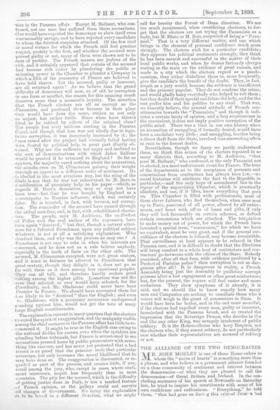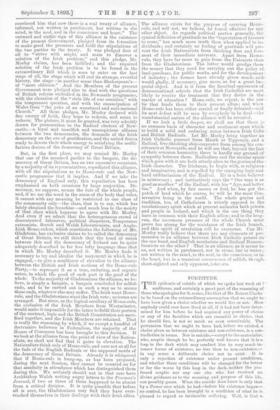THE ALLIANCE OF THE TWO DEMOCRACIES AirR. JOHN MORLEY is
one of those Home-rulers to —U. whom the "union of hearts" is something more than a phrase, and who believe in a permanent alliance founded on a close community of sentiment and interest between the democracies—or what they are pleased to call the democracies—of Great Britain and Ireland. In the con- cluding sentences of his speech at Newcastle on Saturday last, he tried to inspire his constituents with some of his own confidence and enthusiasm. "Everything," he told them, "that had gone on durir g this critical Sessien had convinced him that now there is a real treaty of alliance, informal, not written in parchment, but written in the mind, in the soul, and in the conscience and heart." The outward and visible sign of this alliance is the existence of the present Government, pledged from its formation to make good the promises and fulfil the stipulations of the two parties to the treaty. It was pledged first of all to "strive with might and main to discover a solution of the Irish problem," and this pledge, Mr. Morley claims, has been fulfilled ; and the reluired solution of the Irish problem is to be found in the extraordinary Bill which is soon to enter on the last stage of all, the stage which will end its strange, eventful history, the stage—in another sense than Shakespeare's— of "mere oblivion." And the Members of the present Government were pledged also to deal with the questions of British reform embodied in the Newcastle programme, with the elevation of the "civic life of our counties," with the temperance question, and with the emancipation of Wales from "the yoke of an unnatural and. anti-national Church." All these pledges, Mr. Morley declared with fine energy of faith, they hope to redeem, and mean to redeem. The picture, it must be granted, was very adroitly drawn for presentation to the Radical electors of New- castle,—a loyal and unselfish and unsuspicious alliance between the two democracies, the demands of the Irish democracy on the eve of gratification, and the united forces ready to devote their whole energy to satisfying the multi- farious desires of the democracy of Great Britain.
But, in the first place, we may remind Mr. Morley that one of the assumed parties to the bargain, the de- mocracy of Great Britain, has on two successive occasions, by a majority of its representatives, repudiated this alliance, with all the stipulations as to Home-rule and the New- castle programme that it implies. And if we take the democracy of England only, this repudiation has been emphasised on both occasions by large majorities. De- mocracy, we suppose, means the rule of the whole people, and, if we use the word in the sense of the body that rules, it cannot with any meaning be restricted to one class of the community only—the class, that is to say, which has lately obtained the franchise—and much less to the moiety of that class which happens to agree with Mr. Morley. And even if we admit that the heterogeneous crowd of discontented labourers, political dissenters, Temperance extremists, Scotch and Welsh Liberationists, and Anglo- Irish Home-rulers, which constitutes the following of Mr. Gladstone, has exclusive claims to be called the democracy of Great Britain, we still think that the bond of union between this and the democracy of Ireland can be quite adequately described in far less lofty language than that in which Mr. Morley described it. Mr. Morley finds it necessary to try and idealise the moyement in which he is engaged,—to give a semblance of elevation to the alliance between the British and Irish sections of the Home-rule Party,—to represent it as a true, enduring, and organic union, in which the good of each part is the good of the whole. To the majority of Gladstonians the alliance, we be- lieve, is simply a bargain, a bargain concluded for selfish ends, and to be carried out in such a way as to secure those ends, whatever else may suffer. The Irish want Home- rule, and the Gladstonians want the Irish vote ; so terms are arranged. But since, as the logical corollary of Home-rule, the exclusion of the Irish Members from Westminster, would make it impossible for the latter to fulfil their portion of the contract, logic and the British Constitution are sacri- ficed together, and the Irish Members are retained. That is really the reasoning by which, if we except a handful of doctrinaire believers in Federalism, the majority of the House of Commons has been brought to this decision. If we look at the alliance from the point of view of the Nation- alists, we shall not find that it gains in elevation. The Nationalists think only of Home-rule, and care not at all for the fads of the English Radicals or the supposed needs of the democracy of Great Britain. Already it is whispered that if Home-rule is hung-up, as has been proposed, during the next Session, they cannot be counted on for that assiduity in attendance which has distinguished them during this. We certainly should not in that case have Archbishop Walsh writing angry letters to the Freeman's Journal, if two or three of them happened to be absent from a critical division. It is quite possible that before all is over, the Gladstonians may find they have over- reached themselves in their dealings with their Irish allies. The alliance exists for the purpose of carrying Home- rule, and will not, we believe, be found effective for any other object. As regards political parties generally, the, cynical definition of gratitude as the "expectation of favours- to come," has much more truth than when applied to in- dividuals; and certainly no feeling of gratitude will pre- vent the Irish Nationalists from thinking first and fore- most of their immediate interests. Apart from Home- rule, they have far more to gain from the Unionists than from the Gladstonians. The latter would grudge them the money that they need for carrying out the policy o£ land-purchase, for public works, and for the development., of industry ; the former have already given much, and, would gladly, if necessary, give more, as for a great Im- perial object. And is it from the fanatical opponents of , denominational schools that the Irish Catholics are most likely to receive the treatment that they desire in the matter of education ? Home-rule, we repeat, is the one - tie that binds them to their present allies ; and when Home-rule has been either carried or finally defeated—and its next defeat will be seen by everybody to be final—the unsubstantial nature of the alliance will be revealed. . If we look a little deeper, we shall see that there is no common basis of character and sentiment upon which- to build a solid and enduring union between Irish Celts, and British Radicals. Let Mr. Morley bring together an Irish Catholic peasant from Meath or Tipperary, and a Radical, free-thinking ship-carpenter from among his con- stituents at Newcastle, and he will see that, beyond the fact • of their common humanity, there is hardly any ground of sympathy between them. Radicalism and the secular spirit- which goes with it are both utterly alien to the genius of the Irish character. The Irishman, to begin with, is religious.. and imaginative, and is repelled by the cramping logic and hard utilitarianism of the Radical. He is a born believer- in aristocracy ; and instinctively caps the " One man is as good as another" of the Radical, with his "Aye, and better too." And when, by fair means or foul, he has got the patch of land which he craves, he will be the most Con- servative being in the world. The whole genius and tradition, too, of Catholicism is utterly opposed to the revolutionary spirit which at present animates both priests, and people in Ireland, and which is the one thing they, have in common with their English allies ; and in the long,. run, the enormous pressure of the whole Church must prove too strong for the resistance of the Irish branch„ and this spirit of revolution will be overcome. Can Mr. Morley really believe that there are any elements of per- manence in an alliance between Irish Catholic priests on- the one hand, and English secularists and Radical Noncon- formists on the other P That is an alliance, as it seems tcr • us, not written in parchment, nor in stone, but in water ; not written in the mind, in the soul, in the conscience, or in the heart, but in a transient concui rence of selfish, though, short-sighted and only apparent, interests.



































 Previous page
Previous page